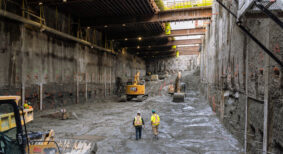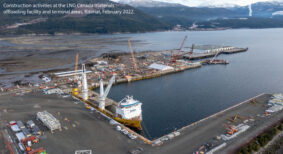With major mining, liquid natural gas (LNG) and pipeline projects in British Columbia scheduled to start in the next few years, the construction industry will be challenged to meet the demand.
One major pipeline project proposed by Kinder Morgan will see an expansion of its current 1,150-kilometre pipeline between Strathcona County, Alta. (near Edmonton) and Burnaby, B.C. The proposed expansion would create a twinned pipeline that would increase the capacity of the system from 300,000 barrels per day to 890,000 barrels. The project capital cost is $5.4 billion.
If approved by the National Energy Board, construction will take place in phases between 2016 and 2018. Peak manpower is estimated at 4,500, and the project will place significant demand on various sectors of the construction industry.
Greg Toth, Kinder Morgan project director, noted that there are up to seven major proposed LNG facility and pipeline projects in B.C., plus B.C. Hydro’s Site C proposal and mining projects.
“Obviously not all of them are going to go ahead. It’s a bit of a race to market. But if they all happen, there’s not enough construction capacity and enough skilled workers to make all of them happen — definitely a concern,” he said at a Vancouver Regional Construction Association breakfast session.
He shared insights into the early stages of the Trans Mountain Pipeline (TMPL) expansion project, and discussed what it will mean for the construction industry. He stressed the diverse number of trades, suppliers and support services that will be required, including welders, carpenters and truck drivers. He also acknowledged a skills crunch challenge.
Toth said that the company is already collecting information on suppliers and contractors wanting to work on the project.
Announced in May 2012, the expansion will require 980 kilometres of new pipeline (36-inch diameter) to be built, mainly along the existing right-of-way corridor.
“Eighty per cent of the new pipeline is expected to be adjacent to the existing TMPL right of way,” Toth said. “One of the things that separates us from other pipeline projects is we have an existing operations — 60 years in the ground, so our number one objective was to follow the existing line as much as possible.”
Some environmental and engineering constraints in the B.C. interior will require innovative construction techniques, such as micro-tunnelling or trenchless technology, he added.
The project will also require related infrastructure, including 11 new pump stations, 21 storage tanks, three new loading berths and one utility berth at the Westridge Terminal in Burnaby, B.C.
“There is a lot of infrastructure required that has to be built with that pipeline. The facility side of this project is a sizable project in itself,” Toth said, noting construction will be on a “very aggressive” two-year timeline.
Facility construction will mean a broad range of opportunities, including civil, electrical and tank fabrication.
“Tank fabrication and construction — there are only two contractors in Canada that fabricate tanks,” Toth noted. “We’re not the only project in town, and tank construction and tank demand is huge.”
Toth acknowledged opposition to the project, but stressed that a lot of misinformation exists in the media.
Trans Mountain is engaging with landowners, Aboriginal groups, communities and stakeholders in all aspects of the proposed expansion project.
“We supply 90 per cent of the petroleum products used in B.C. through our pipeline,” he said.
Another benefit of the project cited was economical, notably the tax revenues for various levels of government. Most of the economic benefits will occur in B.C. and Alberta, with focused opportunities for communities along the route, Toth said.
Kinder Morgan made its formal application to the National Energy Board in December 2013. The anticipated regulatory review period is two years, Toth said, so tendering and awarding contracts will occur in 2015.
He encouraged the industry to self-register online, where the company is currently building a procurement database for interested companies.
Cheryl Mah is the managing editor of Construction Business.









